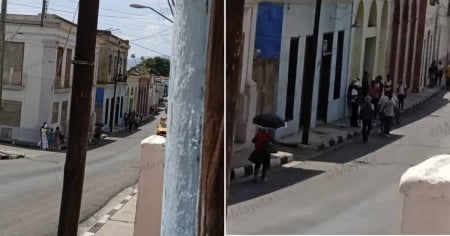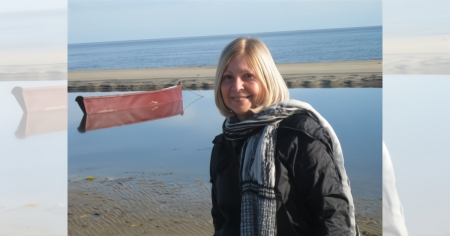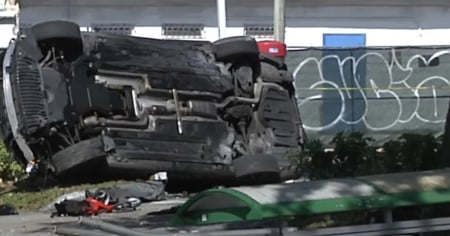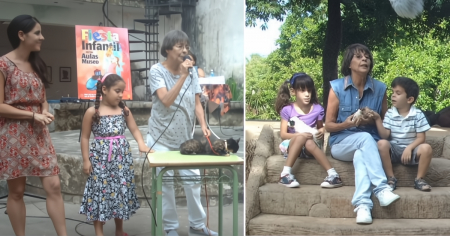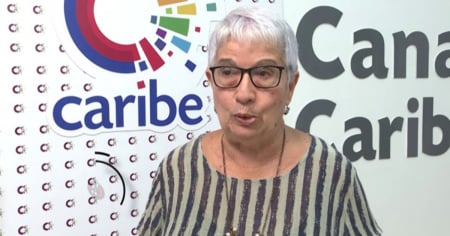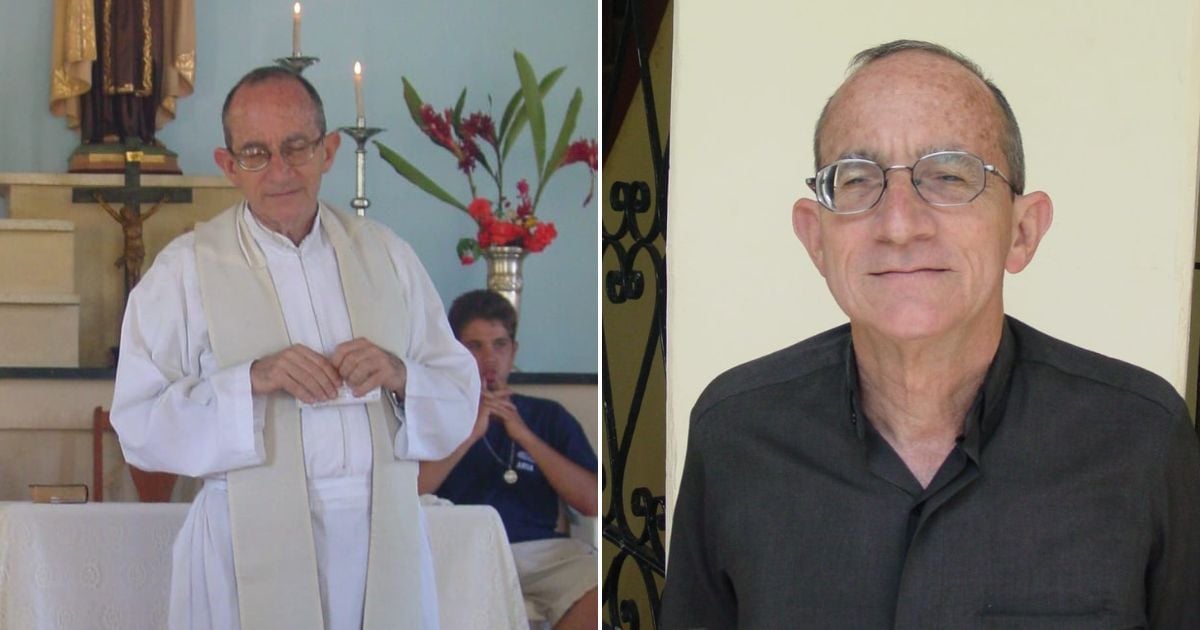
Related videos:
The Cuban Catholic Church is in mourning: on Wednesday night, Monsignor Manuel Hilario de Céspedes García-Menocal, the emeritus bishop of Matanzas and a beloved figure among the Catholic communities of Pinar del Río and all of Cuba, passed away.
The news was confirmed by the Diocese of Pinar del Río through a note published on its official Facebook profile, where they fondly remembered the life and legacy of the priest.

"Tonight, March 26, 2025, the Catholic Church has received the sad news of the passing to the House of the Father of the last of the De Céspedes García-Menocal," the Diocese stated in its announcement.
“Msgr. Manuel Hilario has marched alongside Him who formed and called him from the very beginning to be a shepherd of His sheep,” emphasized the publication.
Born in La Víbora, Havana, on March 11, 1944, Manuel Hilario was the youngest of five siblings and emigrated with his family in 1961 to Puerto Rico, where he studied Electrical Engineering before entering the San José Seminary in Caracas, Venezuela.
He was ordained a priest on May 21, 1972, and in 1984, after more than two decades away from the Island, he returned to Cuba to fully engage in pastoral life.
“He was returning to Cuba, the Homeland where his ancestors had fought for its freedom, and had instilled that same love in subsequent generations,” recalled the Diocese.
During his ministry, he dedicated himself wholeheartedly to multiple rural and urban parishes in Pinar del Río. He also served as a parish priest in Las Minas de Matahambre and Santa Lucía, and later founded the parish of San Francisco de Asís in the Reparto Hermanos Cruz.
Since 1986, he has also taken on the role of parish administrator of the temple of Our Lady of Charity.
His life was marked by a deep closeness to ordinary people, as he was known for sitting in a corner of the temple before mass, ready to listen to confessions or take names of the deceased to include in the prayer.
In addition, he would visit communities, accompany youth groups, celebrate catechesis, and even join cultural activities: “I participated with them in whatever it was: a gathering, a training meeting, a Buena Fe concert, singing with them 'Yolanda' or 'Probablemente'.”
In 2005, Pope Benedict XVI appointed him as the bishop of Matanzas, a position he held until his retirement. The retirement occurred for health reasons, considering the advanced age of the Bishop Emeritus.
He also played an active role in the historic Cuban National Ecclesial Meeting (ENEC) of 1986 and served as an advisor for the Catholic magazine Vitral, for Youth Ministry, and as chancellor of the Diocesan Curia.
Those who knew him highlight his strong character, but always generous and open, as it was common for him to respond to any request with his classic phrase: "What do you want?" before rearranging his schedule.
When someone thanked him, he would humbly reply, "To serve God, the Homeland, and you."
The Catholic community remembers him as a shepherd who devoted his life entirely: “How can we speak of simple people while respecting their humility and without deviating from the truth? The facts of his life speak for themselves,” his colleagues stated in the note.
His pastoral work transformed the communities he served as he organized house-to-house missions, promoted lay participation, deepened the spiritual observance of liturgical seasons, and never stopped bringing communion to the sick or visiting those in greatest need.
Additionally, he was concerned about political prisoners in Cuba. In 2021, he visited the political prisoner Félix Navarro Rodríguez, president of the opposition Party for Democracy Pedro Luis Boitel, who was detained during the protests of July 11 in Cuba and was on a hunger strike at that time.
“Today we give thanks to God for all the great memories He left us. The friendship and simplicity, the poverty and spirit of sacrifice, the intimate relationship with God and love for the homeland, the joy and the reprimand,” the statement notes. “The life of Father Manolo has been a gift to us.”
With his death, Cuba loses not only an exemplary priest but also the last descendant of his family branch: Manuel Hilario was the great-great-grandson of Carlos Manuel de Céspedes, the initiator of the wars of independence and considered the Father of the Homeland.
The wake for Monsignor Manuel Hilario de Céspedes took place this Thursday at the Cathedral of San Carlos Borromeo in the city of Matanzas, where faithful, priests, and friends gathered to pay tribute and give thanks for his life dedicated to pastoral service.
“Wake in the Cathedral of San Carlos Borromeo in Matanzas, Cuba, for Mons. Manuel Hilario de Céspedes García-Menocal, emeritus bishop of Matanzas and brother of Mons. Carlos Manuel de Céspedes García-Menocal, the last descendants of the Father of the Fatherland. Rest in peace, and may perpetual light shine upon him,” wrote user Fernando Suárez on Facebook, reflecting the respect and admiration that his figure evokes among Cubans both on the island and abroad.
A family member, Julio Héctor Smith García-Menocal, also shared some farewell words on social media: “My uncle, Mons. Manuel Hilario de Céspedes y García Menocal is now home with Our Father. Along with the entire family,” he wrote, in a message of faith that reflects the feelings of closeness and Christian hope that characterized his farewell.
The Catholic activist Dagoberto Valdés Hernández also shared a heartfelt message on Facebook in tribute to Monsignor Manuel Hilario de Céspedes. “He has returned to the House of the Father, His Excellency Mons. Manuel Hilario de Céspedes y García Menocal, emeritus bishop of Matanzas. Our Father Manolo was a deeply patriotic Cuban, a coherent and prophetic Christian, an exemplary priest, and a diligent bishop,” he wrote.
"It is an honor for me to have worked together from 1984 to 2005," Valdés stated. "He was exemplary in promoting the laity, encouraging us and allowing us to take on the responsibilities inherent to our vocation and mission. He called me compadre because he was the godfather of my son Javier. I learned a lot from his love for Christ, for Cuba, and for his Church, united without any cracks, in one heart. He was a fervent devotee of the Virgin of Charity and of the Venerable Father Félix Varela. I give thanks for his fruitful life. May he rest in the embrace of his Father God. Amen."
Frequently Asked Questions about the Legacy of Monsignor Manuel Hilario and the Situation of the Elderly in Cuba
Who was Monsignor Manuel Hilario de Céspedes García-Menocal?
Monsignor Manuel Hilario de Céspedes García-Menocal was an emeritus bishop of Matanzas, known for his dedication to the Catholic communities of Pinar del Río and throughout Cuba. As a great-great-grandson of Carlos Manuel de Céspedes, the Father of the Homeland, his life was marked by a deep love for Cuba and its people. His legacy includes active participation in the pastoral life of the country, where he founded parishes, promoted lay involvement, and was a beloved figure for his closeness and commitment to the people.
How did Monsignor Manuel Hilario impact the communities he served?
Monsignor Manuel Hilario transformed the communities he served through his dedication and closeness to the people. He organized missions house by house, promoted liturgical seasons with spiritual depth, and never stopped bringing communion to the sick or visiting those in need. His generous and open character allowed him to connect deeply with people, leaving them a legacy of friendship, simplicity, and love for the homeland.
What is the current situation of the elderly in Cuba?
The situation of the elderly in Cuba is critical due to the economic crisis and the lack of state support. Many elderly individuals live in extreme poverty, without access to basic food and facing precarious living conditions. Community initiatives like that of Manuel Jesús in Pinar del Río aim to alleviate this situation, but state support remains insufficient.
What actions have activists taken to help the elderly in Cuba?
Activists like Manuel Jesús and others in various Cuban provinces have organized food distributions and donations for vulnerable elderly individuals. These initiatives aim to address the immediate needs of neglected seniors and foster solidarity among citizens to improve their living conditions.
Filed under:

